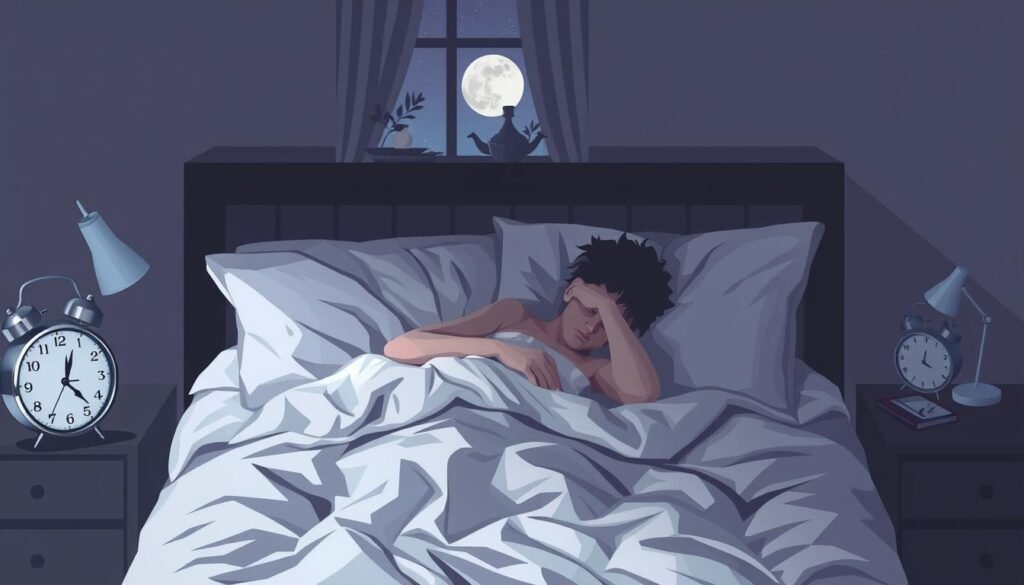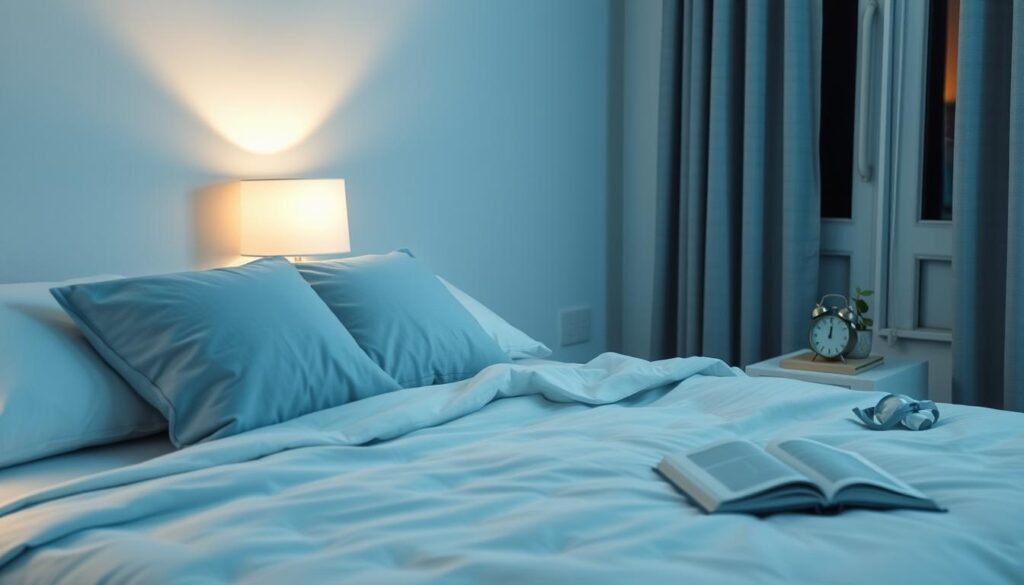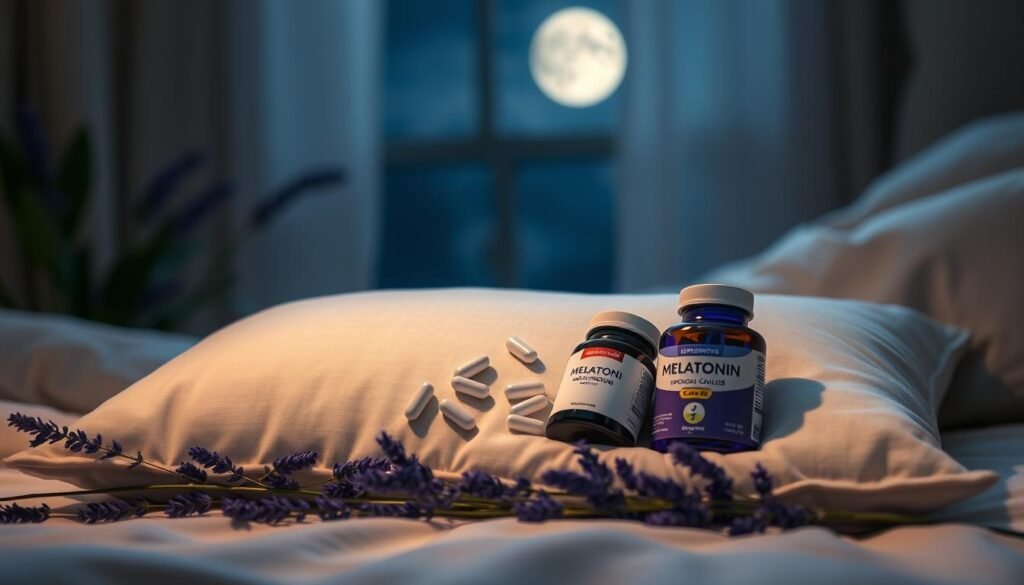Did you know that nearly 47 million Americans struggle with sleep every night? They can’t get the seven hours that are recommended. This issue hits harder for people with chronic issues like multiple sclerosis (MS), as insomnia can make life much tougher.
Many with MS find sleep hard to come by, more so than the average person. In fact, a study has revealed they’re twice as likely to suffer sleep disorders. This piece aims to share ways to beat ms insomnia treatment, using both natural and medical paths for better sleep among MS patients.
Natural solutions for MS insomnia are out there, and knowing about good sleep habits is a start. Tackling sleep issues is crucial, not only for rest but for one’s overall health too. For those looking for detailed info, the Sleep Foundation offers great advice. Now, let’s dig into the link between MS and insomnia.
Key Takeaways
- Insomnia is a big problem for those living with multiple sclerosis, affecting their health.
- Mindfulness and relaxing exercises can make a big difference in sleep quality.
- Sleep hygiene is key to fighting off sleep issues.
- Things like magnesium and melatonin could help ease insomnia.
- Behavior therapies offer a lasting way to manage insomnia, better than drugs alone.
- It’s important to talk to doctors for advice tailored to MS-related sleep troubles.
Understanding Multiple Sclerosis and Insomnia
Multiple sclerosis (MS) is a chronic autoimmune disease that impacts the central nervous system. It leads to various neurological challenges. Insomnia is common in MS patients, affecting about 50-60% of them. This sleep issue is due to pain, fatigue, and discomfort.
It’s key to understand MS to tackle insomnia. Spasticity, bladder issues, and mood swings disrupt sleep. Treatments that focus on these symptoms improve sleep by 70-80%. Managing these symptoms well leads to better sleep.
A regular bedtime routine can enhance sleep by 40%. Meditation and relaxing before bed helps. Also, cutting down on naps or shortening them can boost night sleep by 30%.
Life habits like caffeine and alcohol intake affect insomnia. Avoiding these 4-6 hours before bed reduces insomnia by 25-35%. Exercising, but not right before bed, improves sleep quality by 20-30%.
Devices like FitBit and Apple Watch track sleep for those with MS. They provide real-time sleep data. Looking at all these areas can greatly help MS patients with their sleep struggles.
Common Symptoms of MS Sleep Disorder
A lot of people with MS have trouble sleeping. About 66.45% of them face insomnia, which is much higher than what others experience.
Common insomnia symptoms include:
- Difficulty initiating sleep
- Frequent awakenings throughout the night
- Non-restorative sleep, leading to feelings of fatigue
Insomnia is often just a part of the problem. Anxiety and depression are common too. They make the fatigue and brain fog worse. This mix can harm your health a lot.
Contributing factors to sleep disturbances include:
- Hormonal irregularities leading to sleeping issues such as sleep apnea
- Imbalances in dopamine and norepinephrine affecting sleep patterns
- Daytime fatigue prompting naps, which can disrupt nighttime sleep
- MS-related symptoms such as restless legs and urinary frequency interrupting sleep

Dealing with these sleep issues is key. They do more than make you uncomfortable. They can worsen your life’s quality. Tackling insomnia and fatigue is crucial for those with MS.
MS Insomnia Treatment: Natural Approaches to Improve Sleep
Many folks with multiple sclerosis struggle with sleep issues. They often look for natural insomnia treatment. Techniques like mindfulness and relaxation exercises are key. They help by lowering stress and improving rest, which is vital for well-being.
Mindfulness Meditation Techniques
Mindfulness meditation helps a lot with sleep. It includes controlled breathing and being aware of the moment. These actions lessen anxiety and stress. Studies show they cut down on the time awake at night. For those fighting insomnia caused by multiple sclerosis, these techniques are a great help.
Importance of Relaxation Exercises
Relaxation exercises, like muscle relaxation and guided imagery, are beneficial. They’re recommended by the American Academy of Sleep Medicine for insomnia. Doing these exercises regularly makes you feel calm and helps with better sleep. Adding yoga and stretching can also make bedtime more peaceful. Together, they make the perfect setting for good sleep and lasting benefits.
Natural aids, such as lavender oil or chamomile tea, boost the impact of mindfulness and relaxation. For more on natural sleep solutions, check this informative resource. Consistently using these practices improves sleep quality, especially for those dealing with MS-related insomnia.
| Technique | Description | Benefits |
|---|---|---|
| Mindfulness Meditation | Practices focusing on breathing and awareness | Reduces anxiety, enhances sleep quality |
| Progressive Muscle Relaxation | A technique involving tensing and relaxing muscle groups | Promotes calmness and sleepy sensations |
| Yoga | Gentle physical exercises combined with breath control | Improves relaxation and reduces stress levels |
| Herbal Teas | Warm beverages made from calming herbs | Induces relaxation and prepares the body for sleep |
The Role of Sleep Hygiene Techniques
Sleep hygiene techniques are key for better sleep, especially for people with Multiple Sclerosis. A regular bedtime routine and a good sleep setting can boost sleep. They help one both fall asleep and stay asleep.
Creating an Effective Bedtime Routine
Having a bedtime routine is crucial for a proper sleep schedule. This may involve:
- Going to bed and waking up at the same time every day
- Engaging in relaxing activities, such as reading or gentle stretching
- Avoiding screens and bright lights at least an hour before bedtime
- Practicing mindfulness or deep breathing exercises to unwind
Adding these steps can really improve sleep patterns. It makes facing a new day easier.
Keeping Your Sleep Environment Optimal
Making your sleep environment better is another important sleep hygiene step. Consider these tips:
- Maintaining a dark room, to help with melatonin production
- Keeping the room cool, ideally between 60-67 degrees Fahrenheit
- Ensuring a quiet space, maybe with white noise or earplugs
- Having cozy bedding and a supportive mattress
A well-set and calm environment promotes relaxation. It also improves sleep for those with insomnia.

| Sleep Hygiene Technique | Description | Benefit |
|---|---|---|
| Bedtime Routine | Consistent sleep and wake times, relaxing pre-sleep activities. | Improved ability to fall asleep and stay asleep. |
| Optimal Sleep Environment | Cool, dark, and quiet room with comfortable bedding. | Reduced disturbances leading to restorative sleep. |
| Relaxation Techniques | Mindfulness, meditation, and deep breathing exercises before bed. | Lower stress levels and promote calmness. |
| Avoid Stimulants | Limit caffeine and nicotine intake in the evening. | Enhances the ability to fall asleep easily. |
Supplementing for Better Sleep
People with insomnia due to multiple sclerosis may find help with certain supplements. Melatonin supplements and magnesium are popular for their sleep benefits. These natural aids are known to improve how well you sleep.
Benefits of Melatonin Supplements
Melatonin is a hormone that helps control when you sleep and wake up. Taking melatonin supplements can make it easier to fall asleep. They work well if taken 30 minutes to 2 hours before going to bed.
These supplements are useful for those with sleep problems, like shift workers or those with jet lag. Melatonin supplements are typically recommended in doses from 1 to 3 milligrams.
How Magnesium Can Improve Sleep Quality
Magnesium is great for a good night’s sleep because it relaxes your muscles. It’s especially helpful for people who can’t sleep because of anxiety or stress. But many adults don’t get enough magnesium, which might affect their sleep.
Eating foods high in magnesium or taking supplements can make a big difference. Research shows that magnesium can greatly improve sleep quality. This makes it a top choice for natural sleep help.

| Supplement | Benefits | Recommended Dosage |
|---|---|---|
| Melatonin | Regulates sleep-wake cycle, helps with falling asleep | 1-3 mg, 30 minutes to 2 hours before bed |
| Magnesium | Relaxation, improved sleep quality, reduces insomnia symptoms | Varies; often found in dietary sources and supplements |
Melatonin and magnesium are effective for better sleep quality. For more info on these sleep aids, visit this resource.
Integrating Cognitive Behavioral Therapy for Insomnia
Cognitive Behavioral Therapy for Insomnia (CBT-I) is a good choice for those with sleep problems, including people with multiple sclerosis (MS). It helps identify and change the thoughts and actions that cause insomnia. Studies show CBT-I works better than medication alone.
CBT-I uses psychological methods to improve sleep. It promotes good sleep habits and changes negative thoughts about sleep. Over 70% of people in therapy see a big drop in insomnia symptoms. This is especially important for MS patients who struggle with sleep issues.
CBT-I combines relaxation skills and strategies to limit time in bed. Research shows it reduces the time it takes to fall asleep and night awakenings. People also report feeling very satisfied with CBT-I treatment.
| Measure | Before CBT-I | After CBT-I | Change |
|---|---|---|---|
| Sleep Onset Latency | Average time in minutes | Statistically significant reduction | ~30 minutes decrease |
| Total Sleep Time | Baseline hours | Improved duration | Increased efficiency |
| Insomnia Severity Index Score | Initial score | Lower score | Notable decrease |
Using CBT-I not only improves sleep but also reduces daytime tiredness and boosts quality of life. Exploring the full potential of CBT-I can reveal its key role in successfully managing insomnia, especially for those with MS.
Medical Treatments for MS Insomnia
People with MS may struggle with sleep problems, making it crucial to know about insomnia treatments. Doctors often suggest sleep medicines when other methods don’t work. These drugs can restore rest, helping to manage MS better.
Understanding Sleep Medications
Today, we have many kinds of sleep medicines, each working differently. Over-the-counter options like diphenhydramine offer sedative effects. For tougher insomnia, doctors might prescribe zolpidem or doxepin. These help calm the brain, making it easier to sleep.
While these medicines are helpful, they might have downsides like mood changes or addiction. It’s important to be aware of these potential side effects.
When to Consider Prescription Options
Deciding on insomnia treatment requires thought. Prescriptions are usually for serious cases or when other medicines fail. Things like symptom severity and past treatments play a role in this decision. Talking to healthcare providers is key. They help figure out which medical options are best.
MS Fatigue Management Strategies
Managing fatigue is key for those with multiple sclerosis (MS). Most people with MS experience fatigue, impacting energy and sleep. It’s crucial to find effective strategies for daily life and better well-being.
Exercise as a Tool for Reducing Fatigue
Exercise helps fight MS fatigue. A mix of aerobic and resistance exercises can lower fatigue. Aiming for 150 minutes of moderate exercise weekly boosts stamina and reduces symptoms. Occupational and physical therapy can also support these efforts, making a big difference in managing MS fatigue.
Diet’s Impact on Energy Levels and Sleep
Eating well supports energy and good sleep. Include whole grains, fruits, and vegetables for key nutrients. These foods boost energy all day long. Knowing how diet affects energy and sleep helps create a strong fatigue management plan. This plan will improve daily life by addressing all lifestyle aspects.
Learn more about MS fatigue management at fatigue management strategies for MS.
Conclusion
Addressing insomnia in people with multiple sclerosis (MS) means looking at both natural and medical strategies. MS can make it hard to sleep well. This affects about 40% of those living with it. Knowing why sleep problems happen is key to treating them.
Good sleep habits, relaxation techniques, and dietary supplements are part of a whole approach. Working with doctors helps create a plan that suits each person. Cognitive behavioral therapy for insomnia (CBT-I) has shown great results. It significantly improves sleep quality.
Finding ways to sleep better is crucial for health. Helpful tips can be found on websites like this comprehensive guide. Using a variety of methods can greatly improve sleep for those with MS.